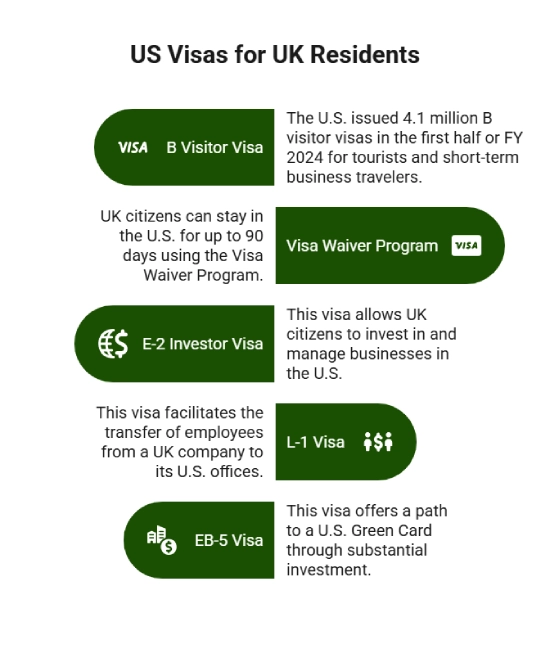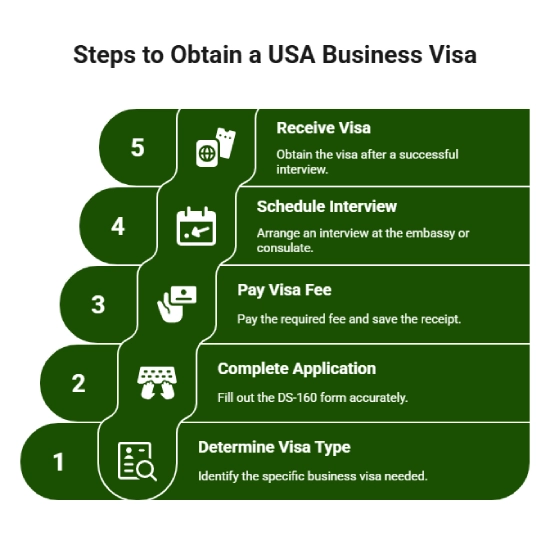USA Business Visa – Complete Guide for UK Entrepreneurs and Professionals
Are you thinking about growing your business or going to important meetings in the United States? A U.S. Business Visa lets UK workers and business owners do many business things there.
- In the first six months of 2024, the U.S. gave out almost 4.1 million B visitor visas for both tourists and people traveling for short-term business.
- If you are a UK citizen, you can use the Visa Waiver Program to stay in the U.S. for up to 90 days.
- The E-2 Investor Visa lets people from the UK put money into and run businesses in the U.S.
- The L-1 Visa makes it easier to move employees from a UK company to its U.S. offices.
- The EB-5 Visa is a way to get a U.S. Green Card by making a big investment.

*Want to apply for USA Business Visa? Sign up with Y-Axis for comprehensive support with the process.
What is the USA Business Visa?
The B-1 visa is a type of US nonimmigrant visa that permits foreign citizens to enter the country for short-term business activities. It is intended for people who will be involved in business or professional actions while in the US, but who do not plan to stay or work there permanently.
Permitted Activities with a U.S. B-1 Visa
Under U.S. immigration rules (USCIS, CBP, and U.S. Department of State guidance), the following business-related activities are generally allowed on a B-1 visa, provided you do not receive salary or remuneration from a U.S. source and do not engage in productive employment:
- Business meetings with U.S. clients, partners, or associates.
- Attending conferences, conventions, or seminars of a business, scientific, educational, or professional nature.
- Contract negotiations with U.S. companies.
- Participating in board of directors meetings as an external or visiting board member.
- Purchasing goods, materials, or supplies for use outside the United States.
- Receiving short-term training from a U.S. company (provided you are employed and paid by a non-U.S. employer).
- Conducting independent research (without hands-on employment or payment from a U.S. source).
- Engaging in litigation-related activities, such as attending trials, giving depositions, or meeting with legal counsel.
- Volunteering without compensation for a religious or non-profit organization in limited, permissible contexts (e.g., speaking engagements, event assistance).
- Inspecting or installing equipment purchased from a foreign company, if done under the conditions allowed by CBP.
- Carrying out contractual obligations on the U.S. Outer Continental Shelf, if qualifying under specific statutory provisions.
Types of USA Business Visas
The various types of USA Business Visas are given below.
- B-1 Business Visitor Visa
- E-2 Treaty Investor Visa
- L-1 Intra-Company Transfer Visa
- EB-5 Investor Green Card
- H-1B (Business Role, Employer-Sponsored)
%20(1).webp)
B-1 Business Visitor Visa
The B-1 visa serves as a non-immigrant route for foreign nationals who want to enter the U.S. for short-term business activities. These activities can include things such as attending meetings, going to conferences, and negotiating contracts. Note that this visa does not allow people to work or look for jobs in the U.S.
E-2 Treaty Investor Visa
The E-2 Treaty Investor visa allows investors from countries with treaties of commerce and navigation with the U.S. to come to the U.S. to direct and develop a business they have invested in. This visa is for people who plan to create or purchase a business in the U.S. and manage its operations. While temporary, the visa can be extended as long as the business is operating and the investor continues to meet all criteria.
L-1 Intra-Company Transfer Visa
The L-1 visa is a non-immigrant option that allows a U.S. company to transfer employees from a foreign office to the U.S. temporarily. This visa is for global companies that need to bring executives, managers, or workers with special knowledge to their U.S. offices. The employee can stay in the U.S. for a limited time, but they remain employed by the foreign company.
EB-5 Investor Green Card
The EB-5 visa, also known as the Immigrant Investor Visa, gives foreign people a chance to obtain a U.S. Green Card by investing in a commercial enterprise in the United States. To qualify, investors must invest a certain amount of capital and create or preserve a specific number of jobs for U.S. workers.
H-1B (Business Role, Employer-Sponsored)
The H-1B visa allows firms in the United States to employ foreign individuals in roles needing specialized skills for a set time. These positions typically demand a bachelor's degree or higher in a relevant field because they involve specialized knowledge. Firms must submit the visa application for the prospective employee.
Eligibility Criteria for USA Business Visa
The eligibility criteria for the USA Business Visa are given below.
- A valid passport is required.
- The reason for travel must match the visa type.
- Evidence of enough money to pay for costs in the U.S. is needed.
- Solid connections to the UK are necessary to show plans to return.
- Applicants must not have a criminal history or past immigration offenses.
.webp)
Document Requirements
The documents required to apply for the USA Business Visa are given below.
- A completed DS-160 form is required.
- A valid passport is needed. It must be valid for at least six months beyond your planned stay.
- You must have your visa application fee receipt.
- A photograph that meets U.S. visa specifications is necessary.
- You will need supporting documents that relate to the specific visa you are applying for. Examples include invitation letters, proof of investments, and letters from employers.
USA Business Visa Application Process
The procedure to apply for the USA Business Visa is given below.
Step 1: Decide what type of business visa you require.
Step 2: Complete the online non-immigrant visa application (DS-160) carefully.
Step 3: Pay the visa fee. Save the payment receipt to present during the interview.
Step 4: Schedule an interview at the U.S. Embassy or Consulate. Be sure to bring all necessary documents with you to the visa interview.
Step 5: Receive your USA Business Visa.

Visa Fees and Estimated Costs
The table below has complete details of the US Business visa fees:
| Fee Type | Amount |
| Nonimmigrant Visa Application (MRV) – B Category | $185 |
| Visa Integrity Fee (Effective October 1, 2025) | $250 (minimum) |
| Visa Issuance (Reciprocity) Fee | Varies by nationality |
| I-539 Extension of Stay (Online Filing) | $420 |
USA Business Visa Processing Time
The US Business visa processing times can vary depending on the U.S. embassy or consulate where you apply, seasonal demand, and local staffing or security backlogs.
The table below provides a general range for planning purposes.
| Stage | Average processing time |
| Interview Appointment Wait Time | 7 days to 2+ years |
| Post-Interview Visa Issuance | 30 to 90 days |
| Administrative Processing (if applicable) | Few weeks to 1+ year (sometimes longer) |
Note: For the most accurate and current data, always check the U.S. Department of State’s Global Visa Wait Times tool before scheduling your appointment.
Can You Include Family Members?
No, a few USA Business Visa does not allow family members to be included in the USA Business Visa application. Family members cannot be included on a U.S. B1 (business) visa, but they can apply for their own visas to travel with you. Usually, they apply for B2 (tourist) visas. Each family member has to apply separately and show they qualify for the visa.
Here's a more detailed explanation:
- B1 Visa: The B1 visa is only for temporary business trips to the U.S. and doesn't allow you to include family.
- B2 Visa: Family members, like spouses and kids under 21, can apply for B2 visas to come with the B1 visa holder to the U.S.
- Separate Applications: Each family member needs to turn in their own visa application and meet the B2 visa requirements.
- Showing Eligibility: Family members applying for B2 visas need to show they have strong reasons to return to their home country after their visit.
- Common Situation: Often, a B1 visa holder travels for business, and their spouse or family comes with them for tourism or to visit.
Pathway to Green Card or U.S. Citizenship
The EB-5 Immigrant Investor Program is the main way to get a Green Card through business investment in the U.S. Foreign investors can get permanent residency (Green Cards) by investing $800,000 to $1,050,000 in a new business that creates jobs for American workers. After getting a temporary Green Card, investors can apply for a permanent Green Card and, later, citizenship. L-1 & H-1B visas can potentially lead to a Green Card through employer sponsorship.
The E-2 visa does not directly provide a path to a Green Card but can be a way to transition through other methods.
Extend Your Stay in the U.S. with Form I-539
If you need more time in the United States beyond the period granted at entry on your B-1 Business Visitor Visa, you can apply to extend your stay by filing Form I-539, Application to Extend/Change Nonimmigrant Status with USCIS.
Given below are some of the key points to remember if you are looking to extend your stay in the US with a business visa:
- Eligibility: You must currently be in valid B-1 status, have complied with all visa conditions, and request the extension before your I-94 expiration date.
- Extension Duration: Typically granted for up to an additional 6 months, with a maximum stay of about 12 months total on one trip.
- Evidence Required:
- A detailed letter explaining why you need to remain longer for the same business purpose.
- Proof of sufficient funds to support yourself during the extended stay.
- Evidence of ties to your home country (e.g., job, property, family).
- Copy of your current I-94 and passport ID page.
- Fee: $420 for online filing ($470 for paper filing). The $85 biometric services fee was eliminated for I-539 as of October 1, 2023. Premium processing is not available for B-1 extensions.
- Processing Times: It may vary by USCIS service center and workload. It is advised to apply at least 45 days before your authorized stay expires.
Renewal or Switching Visas
- To renew your visa: This is usually done at a U.S. embassy or consulate, similar to a new visa application. Complete Form DS-160, pay fees, and attend an interview.
- To change your status: Use Form I-539 within the U.S. if eligible. For example, changing to a Green Card needs to meet criteria and filing forms.
- Switching Visas: Possible under certain conditions; consult immigration experts for guidance.
How Can Y-Axis Help You?
Y-Axis offers immigration advice to UK professionals and business owners seeking U.S. visas. Our experienced consultants provide support during the visa application process.
Our services include:
- Consultations to determine appropriate visa options.
- Help with preparing and reviewing required paperwork.
- Interview training to increase confidence.
- Advice on visa extensions, renewals, and changes.
- Guidance on family visas for qualifying relatives.
Looking for Inspiration
Explore what Global Citizens have to say about Y-Axis in shaping their future
Frequently Asked Questions
